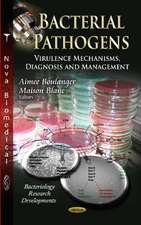Wildlife and Emerging Zoonotic Diseases: The Biology, Circumstances and Consequences of Cross-Species Transmission: Current Topics in Microbiology and Immunology, cartea 315
Editat de James E. Childs, John S. Mackenzie, Jürgen A.. Richten Limba Engleză Hardback – 13 aug 2007
| Toate formatele și edițiile | Preț | Express |
|---|---|---|
| Paperback (1) | 1053.39 lei 38-44 zile | |
| Springer Berlin, Heidelberg – 30 noi 2010 | 1053.39 lei 38-44 zile | |
| Hardback (1) | 1232.41 lei 43-57 zile | |
| Springer Berlin, Heidelberg – 13 aug 2007 | 1232.41 lei 43-57 zile |
Din seria Current Topics in Microbiology and Immunology
- 18%
 Preț: 962.03 lei
Preț: 962.03 lei - 5%
 Preț: 1123.13 lei
Preț: 1123.13 lei - 5%
 Preț: 1085.92 lei
Preț: 1085.92 lei -
 Preț: 499.76 lei
Preț: 499.76 lei - 5%
 Preț: 967.79 lei
Preț: 967.79 lei - 18%
 Preț: 1118.62 lei
Preț: 1118.62 lei - 5%
 Preț: 717.00 lei
Preț: 717.00 lei - 5%
 Preț: 712.97 lei
Preț: 712.97 lei - 5%
 Preț: 709.51 lei
Preț: 709.51 lei - 5%
 Preț: 709.51 lei
Preț: 709.51 lei - 5%
 Preț: 721.19 lei
Preț: 721.19 lei - 5%
 Preț: 359.78 lei
Preț: 359.78 lei - 5%
 Preț: 711.88 lei
Preț: 711.88 lei - 5%
 Preț: 774.81 lei
Preț: 774.81 lei - 15%
 Preț: 640.06 lei
Preț: 640.06 lei - 5%
 Preț: 717.00 lei
Preț: 717.00 lei - 5%
 Preț: 360.34 lei
Preț: 360.34 lei - 5%
 Preț: 707.69 lei
Preț: 707.69 lei - 5%
 Preț: 717.56 lei
Preț: 717.56 lei - 5%
 Preț: 716.28 lei
Preț: 716.28 lei - 5%
 Preț: 717.20 lei
Preț: 717.20 lei - 5%
 Preț: 711.32 lei
Preț: 711.32 lei - 5%
 Preț: 711.88 lei
Preț: 711.88 lei - 5%
 Preț: 718.29 lei
Preț: 718.29 lei - 5%
 Preț: 709.51 lei
Preț: 709.51 lei - 5%
 Preț: 369.84 lei
Preț: 369.84 lei - 5%
 Preț: 712.25 lei
Preț: 712.25 lei - 5%
 Preț: 716.45 lei
Preț: 716.45 lei - 5%
 Preț: 706.60 lei
Preț: 706.60 lei - 5%
 Preț: 711.52 lei
Preț: 711.52 lei - 5%
 Preț: 713.54 lei
Preț: 713.54 lei - 5%
 Preț: 720.47 lei
Preț: 720.47 lei - 5%
 Preț: 725.42 lei
Preț: 725.42 lei - 5%
 Preț: 708.06 lei
Preț: 708.06 lei - 5%
 Preț: 713.70 lei
Preț: 713.70 lei - 5%
 Preț: 705.83 lei
Preț: 705.83 lei - 5%
 Preț: 710.96 lei
Preț: 710.96 lei - 5%
 Preț: 723.93 lei
Preț: 723.93 lei - 5%
 Preț: 707.69 lei
Preț: 707.69 lei - 5%
 Preț: 715.35 lei
Preț: 715.35 lei - 5%
 Preț: 709.87 lei
Preț: 709.87 lei - 5%
 Preț: 359.05 lei
Preț: 359.05 lei - 5%
 Preț: 374.20 lei
Preț: 374.20 lei - 15%
 Preț: 635.31 lei
Preț: 635.31 lei - 5%
 Preț: 707.86 lei
Preț: 707.86 lei - 5%
 Preț: 721.96 lei
Preț: 721.96 lei - 15%
 Preț: 632.88 lei
Preț: 632.88 lei - 15%
 Preț: 632.05 lei
Preț: 632.05 lei - 15%
 Preț: 642.83 lei
Preț: 642.83 lei
Preț: 1232.41 lei
Preț vechi: 1502.94 lei
-18% Nou
Puncte Express: 1849
Preț estimativ în valută:
235.82€ • 246.88$ • 195.13£
235.82€ • 246.88$ • 195.13£
Carte tipărită la comandă
Livrare economică 07-21 aprilie
Preluare comenzi: 021 569.72.76
Specificații
ISBN-13: 9783540709619
ISBN-10: 3540709614
Pagini: 536
Ilustrații: VII, 524 p.
Dimensiuni: 155 x 235 x 40 mm
Greutate: 0.87 kg
Ediția:2007
Editura: Springer Berlin, Heidelberg
Colecția Springer
Seria Current Topics in Microbiology and Immunology
Locul publicării:Berlin, Heidelberg, Germany
ISBN-10: 3540709614
Pagini: 536
Ilustrații: VII, 524 p.
Dimensiuni: 155 x 235 x 40 mm
Greutate: 0.87 kg
Ediția:2007
Editura: Springer Berlin, Heidelberg
Colecția Springer
Seria Current Topics in Microbiology and Immunology
Locul publicării:Berlin, Heidelberg, Germany
Public țintă
ResearchCuprins
Introduction: Conceptualizing and Partitioning the Emergence Process of Zoonotic Viruses from Wildlife to Humans.- Infectious Disease Modeling and the Dynamics of Transmission.- The Evolutionary Genetics of Viral Emergence.- Influenza Viruses in Animal Wildlife Populations.- Overviews of Pathogen Emergence: Which Pathogens Emerge, When and Why?.- Infection and Disease in Reservoir and Spillover Hosts: Determinants of Pathogen Emergence.- Henipaviruses: Emerging Paramyxoviruses Associated with Fruit Bats.- Emergence of Lyssaviruses in the Old World: The Case of Africa.- Tuberculosis: A Reemerging Disease at the Interface of Domestic Animals and Wildlife.- Emergence and Persistence of Hantaviruses.- Arenaviruses.- Ecological Havoc, the Rise of White-Tailed Deer, and the Emergence of Amblyomma americanum-Associated Zoonoses in the United States.- Bats, Civets and the Emergence of SARS.- Poxviruses and the Passive Quest for Novel Hosts.- Ebolavirus and Other Filoviruses.- Pre-spillover Prevention of Emerging Zoonotic Diseases: What Are the Targets and What Are the Tools?.- Impediments to Wildlife Disease Surveillance, Research, and Diagnostics.- Collaborative Research Approaches to the Role of Wildlife in Zoonotic Disease Emergence.- Surveillance and Response to Disease Emergence.
Textul de pe ultima copertă
Wildlife and the zoonotic pathogens they reservoir are the source of most emerging infectious diseases of humans. AIDS, hantavirus pulmonary syndrome, SARS, Monkeypox and the human ehrlichioses are a few examples of the devastating effect achieved by cross-species transmission of viral and bacterial pathogens of wildlife. Many factors contribute to the appearance and spread of a pathogen, including; changes in host/pathogen evolution and interaction, human demographics, behavior and technology, environmental factors, and the availability of health care and a public health infrastructure capable of providing surveillance and interventions aimed at disease prevention and control. Additionally, historical factors and the coalescence of particular circumstances modify the conditions by which pathogens and species have an opportunity to intermix, evolve and spread.
This volume provides an overview of zoonotic pathogen emergence with an emphasis on the role of wildlife. The firstsections of the book explore the mechanisms by which evolution, biology, pathology, ecology, history, and current context have driven the emergence of different zoonotic agents, the next sections provide specific example of disease emergence linked to wildlife, and the final section offers an overview of current methods directed at the surveillance, prevention and control of zoonotic pathogens at the level of the wildlife host and possible mechanisms to improve these activities. This book will be useful to microbiologists, ecologists, zoologists, entomologists as well as physicians and epidemiologists.
This volume provides an overview of zoonotic pathogen emergence with an emphasis on the role of wildlife. The firstsections of the book explore the mechanisms by which evolution, biology, pathology, ecology, history, and current context have driven the emergence of different zoonotic agents, the next sections provide specific example of disease emergence linked to wildlife, and the final section offers an overview of current methods directed at the surveillance, prevention and control of zoonotic pathogens at the level of the wildlife host and possible mechanisms to improve these activities. This book will be useful to microbiologists, ecologists, zoologists, entomologists as well as physicians and epidemiologists.
Caracteristici
Includes supplementary material: sn.pub/extras

















